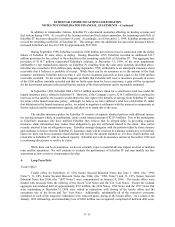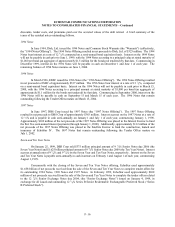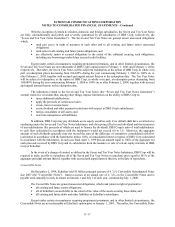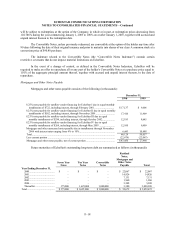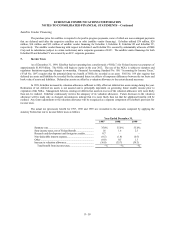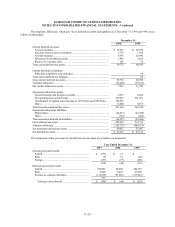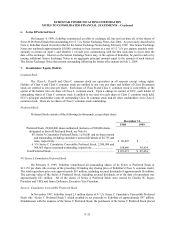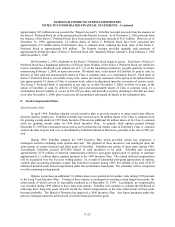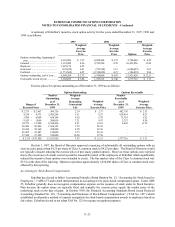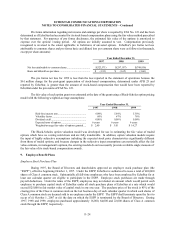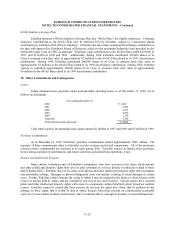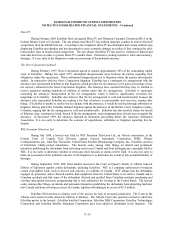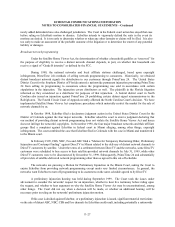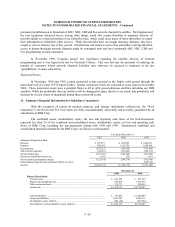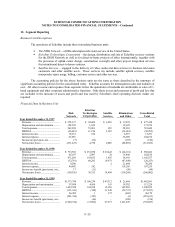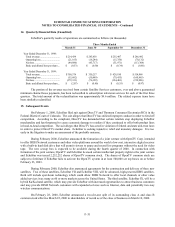Dish Network 1999 Annual Report Download - page 73
Download and view the complete annual report
Please find page 73 of the 1999 Dish Network annual report below. You can navigate through the pages in the report by either clicking on the pages listed below, or by using the keyword search tool below to find specific information within the annual report.
ECHOSTAR COMMUNICATIONS CORPORATION
NOTES TO CONSOLIDATED FINANCIAL STATEMENTS – Continued
F–25
401(k) Employee Savings Plan
EchoStar sponsors a 401(k) Employee Savings Plan (the “401(k) Plan”) for eligible employees. Voluntary
employee contributions to the 401(k) Plan may be matched 50% by EchoStar, subject to a maximum annual
contribution by EchoStar of $1,000 per employee. EchoStar also may make an annual discretionary contribution to
the plan with approval by EchoStar’s Board of Directors, subject to the maximum deductible limit provided by the
Internal Revenue Code of 1986, as amended. EchoStar’s cash contributions to the 401(k) Plan totaled $329,000 in
1997, and $314,000 in 1998 and 1999. Additionally, during 1998, EchoStar contributed 320,000 shares of its
Class A common stock (fair value of approximately $2 million) to the 401(k) Plan related to its 1997 discretionary
contribution. During 1999, EchoStar contributed 260,000 shares of its Class A common stock (fair value of
approximately $3 million) to the 401(k) Plan related to its 1998 discretionary contribution. During 2000, EchoStar
expects to contribute approximately 60,000 shares of its Class A common stock (fair value of approximately
$6 million) to the 401(k) Plan related to its 1999 discretionary contribution.
10. Other Commitments and Contingencies
Leases
Future minimum lease payments under noncancelable operating leases as of December 31, 1999, are as
follows (in thousands):
Year ending December 31,
2000 $ 6,662
2001 6,565
2002 5,912
2003 4,996
2004 2,195
Thereafter 5,760
Total minimum lease payments $ 32,090
Total rental expense for operating leases approximated $1 million in 1997 and 1998 and $3 million in 1999.
Purchase Commitments
As of December 31, 1999, EchoStar’s purchase commitments totaled approximately $209 million. The
majority of these commitments relate to EchoStar receiver systems and related components. All of the purchases
related to these commitments are expected to be made during 2000. EchoStar expects to finance these purchases
from existing unrestricted cash balances and future cash flows generated from operations, if any.
Patents and Intellectual Property
Many entities, including some of EchoStar’s competitors, now have and may in the future obtain patents
and other intellectual property rights that cover or affect products or services directly or indirectly related to those
that EchoStar offers. EchoStar may not be aware of all patents and other intellectual property rights that its products
may potentially infringe. Damages in patent infringement cases can include a tripling of actual damages in certain
cases. Further, EchoStar cannot estimate the extent to which it may be required in the future to obtain licenses with
respect to patents held by others and the availability and cost of any such licenses. Various parties have asserted
patent and other intellectual property rights with respect to components within EchoStar’s direct broadcast satellite
system. EchoStar cannot be certain that these persons do not own the rights they claim, that its products do not
infringe on these rights, that it would be able to obtain licenses from these persons on commercially reasonable
terms or, if it was unable to obtain such licenses, that it would be able to redesign its products to avoid infringement.


